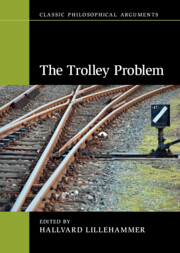Book contents
- The Trolley Problem
- Classic Philosophical Arguments
- The Trolley Problem
- Copyright page
- Contents
- Tables
- Contributors
- Acknowledgments
- Introduction
- 1 Keeping track of your trolleys
- 2 Shunted trolleys and other diversions
- 3 Must we turn the trolley?
- 4 Non-consequentialism in light of the trolley problem
- 5 Non-consequentialist principles under conditions of uncertainty
- 6 The trolley problem and the doing/allowing distinction
- 7 Virtue ethics and the trolley problem
- 8 Trolley dilemmas from the philosopher’s armchair to the psychologist’s lab
- 9 Trolleyology
- 10 Cross-cultural responses to trolley problems and their implications for moral philosophy or
- 11 Ethical accident algorithms for autonomous vehicles and the trolley problem
- 12 A new trolley problem?
- Bibliography
- Index
6 - The trolley problem and the doing/allowing distinction
Published online by Cambridge University Press: 24 February 2023
- The Trolley Problem
- Classic Philosophical Arguments
- The Trolley Problem
- Copyright page
- Contents
- Tables
- Contributors
- Acknowledgments
- Introduction
- 1 Keeping track of your trolleys
- 2 Shunted trolleys and other diversions
- 3 Must we turn the trolley?
- 4 Non-consequentialism in light of the trolley problem
- 5 Non-consequentialist principles under conditions of uncertainty
- 6 The trolley problem and the doing/allowing distinction
- 7 Virtue ethics and the trolley problem
- 8 Trolley dilemmas from the philosopher’s armchair to the psychologist’s lab
- 9 Trolleyology
- 10 Cross-cultural responses to trolley problems and their implications for moral philosophy or
- 11 Ethical accident algorithms for autonomous vehicles and the trolley problem
- 12 A new trolley problem?
- Bibliography
- Index
Summary
This chapter explores the relationship between the Trolley Problem and the distinction between doing and allowing harm. I begin by discussing the origin of the Trolley Problem, considering Philippa Foot’s original version of the case and what Judith Jarvis Thomson’s modification of the cases shows. Thomson’s original (and best) argument presents the bystander trolley case not to undermine the distinction between doing and allowing harm, but to raise questions about precisely what we mean when we say this distinction matters morally. I then consider whether the Trolley Problem challenges the moral relevance of doing/allowing distinction. I show that the trolley case is not a straightforward counterexample to the doing/allowing distinction. But does the Trolley Problem show that the defender of the doing/allowing distinction cannot give a consistent and intuitively acceptable answer to how much harder doing harm is to justify than merely allowing harm? I argue that this concern is misguided. We should expect there to be other morally relevant features that interact with the doing/allowing distinction, strengthening or weakening constraints against doing harm. Consideration of the Trolley Problem shows that both the distinction between doing and allowing harm and a sister deontological distinction are needed.
- Type
- Chapter
- Information
- The Trolley Problem , pp. 101 - 115Publisher: Cambridge University PressPrint publication year: 2023
- 1
- Cited by

